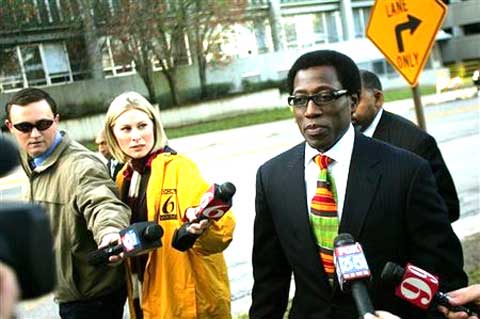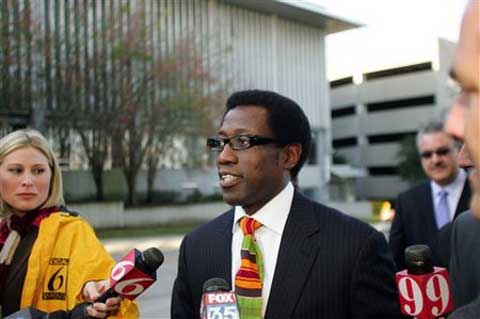
By TRAVIS REED
 |
| Actor Wesley Snipes talks to the media as he walks into the Golden-Collum Memorial Federal Building and U.S. Courthouse in Ocala, Fla. on Tuesday, Jan. 29, 2007. Closing arguments in Snipes' tax-fraud case were to begin this morning, with the case expected to go to a jury this afternoon. (AP Photo/Joe Kaleita)
Copyright 2008 Associated Press. All right reserved. This material may not be published, broadcast, rewritten, or redistributed. |
OCALA, Fla. (AP) - Even Hollywood couldn't have written a more ideal script for the Internal Revenue Service than actor Wesley Snipes' tax-fraud trial.
At a time when millions of Americans are buckling down to prepare their taxes, Snipes is being cast as a villainous example of the dangers of joining with Internet-fueled activists who claim the IRS has no authority to collect taxes.
Snipes, the star of the "Blade" films and "White Men Can't Jump," is on trial with two tax protesters in one of the biggest criminal cases in IRS history, and the agency hopes the media attention on the matter will dissuade others in the "tax avoidance" movement from trying to outwit the government.
"People who do it openly and notoriously, you've got to go after them," said Sheldon Cohen, who was IRS commissioner and general counsel in the 1960s. "Not because he's that important or the amount of money is that important, but because there are others who may be foolish enough to follow."
Snipes, 45, could get up to 16 years in prison if convicted on all counts, although sentences that long are unusual.
His two co-defendants are an anti-tax ideologue who refuses to defend himself in court and an accountant who lost his licenses. The trio rested their defense Monday without calling any witnesses, saying they didn't need to.
 |
Actor Wesley Snipes talks to the media as he walks into the Golden-Collum Memorial Federal Building and U.S. Courthouse in Ocala, Fla. on Tuesday, Jan. 29, 2007. Closing arguments in Snipes' tax-fraud case were to begin this morning, with the case expected to go to a jury this afternoon. (AP Photo/Joe Kaleita) Copyright 2008 Associated Press. All right reserved. This material may not be published, broadcast, rewritten, or redistributed. |
"Nobody likes paying taxes, but paying taxes is the price we pay to live in a civilized society," Assistant U.S. Attorney M. Scotland Morris said Tuesday in closing arguments. "And it's the law, and that's what this case is about. It's about three men who felt they were above the law."
Defense attorney Robert Barnes conceded Snipes' arguments may have been crazy, but insisted that didn't make them criminal.
"Disagreement with the IRS is not fraud of the IRS, is not deception," Barnes said. "It was an attempt to engage the IRS, to go through the IRS procedures and processes and see who's right."
In lengthy filings to the IRS, the three defendants claimed they did not legally have to pay taxes, citing an obscure section of the tax code that establishes that foreign sources of income for U.S. citizens are taxable. Protesters take that to mean only foreign sources are taxable, and wages made in this country are not.
"They string unconnected things together in a way that they're just not intended to be strung together," said Chris Rizek, a former Treasury Department lawyer who specialized in tax policy. "And the courts have repeatedly said 'No, that's the wrong interpretation, listen to this.' And they just don't listen."
Snipes, who is free on $1 million bond, was paying millions in federal income taxes until 2000 when, according to prosecutors, he accepted the arguments of his two co-defendants. Snipes then allegedly began seeking nearly $12 million in illegal refunds for taxes he already paid.
Snipes, alleged ringleader Eddie Ray Kahn and former CPA Douglas P. Rosile were indicted on eight counts alleging tax fraud, conspiracy and willful failure to file returns. Kahn now refuses to leave his jail cell because he believes the court has no jurisdiction to prosecute him.
The government says Kahn founded a group in the 1990s, American Rights Litigators, and a successor group, Guiding Light of God Ministries, that purported to help members legally avoid paying taxes. Rosile, a former accountant who lost his licenses in Ohio and Florida, prepared the paperwork. Snipes joined their group in 2000.
Witnesses for the prosecution have said up to 4,000 people refused to pay taxes based on the group's arguments.
The three men claimed the IRS is not a legitimate government agency. Snipes also argued in long, bizarre letters that he was a nonresident alien; that the IRS terrorizes and deceives citizens; and that efforts to prosecute him would cause "increased collateral risk."
Most tax cases are handled in civil court, because the IRS does not have enough agents or time to pursue criminal charges against ordinary taxpayers who fudge a deduction or a decimal place on their tax returns.
But pursuing the matter in criminal court carries other risks - the burden of proof is higher, and an acquittal would instantly galvanize the tax-avoidance movement, which already enjoys boundless exposure on the Internet.
The IRS has been successful in pursuing criminal cases against the movement's followers.
Last year, for example, a New Hampshire tax protester vowed to die fighting rather than be apprehended following criminal conviction on several tax charges. Several people were arrested trying to help Ed Brown and his wife avoid capture, and almost all of them were from other states.
Brown and his wife were taken peacefully, but only after agents tricked the couple into surrendering.
But there are exceptions. In 2003, FedEx pilot and tax protester Vernice Kuglin was acquitted because the jury found she sincerely believed she didn't have to pay taxes.
Kuglin's assets were seized, and the government got its tax money. Despite that, her case is held by some protesters as proof that the IRS is a sham, and citizens really don't have to pay taxes.
Cohen, the former IRS commissioner, said trials like Snipes' are important to discourage potential tax scofflaws from defying the government.
"Locks are important on windows to keep honest men from becoming thieves," Cohen said. "Because a thief can get into a window even if it's locked, right? But you do that as a deterrent."